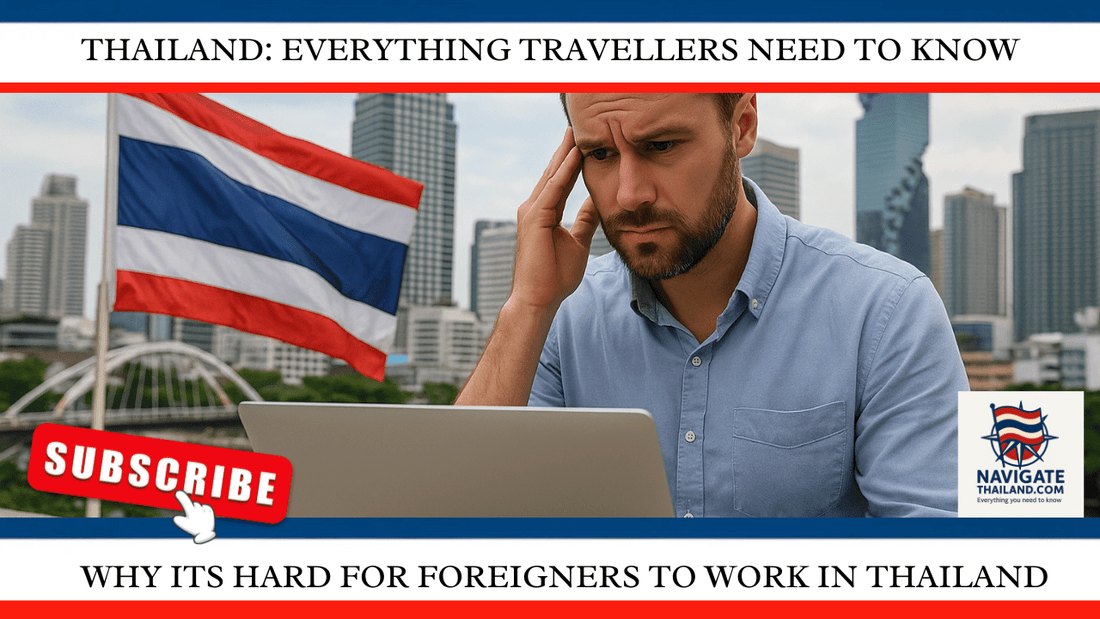
Why It’s Hard for Foreigners to Work in Thailand (and What Jobs Are Available in 2025)
Share
Thailand’s allure as a travel destination is stronger than ever in 2025, with digital nomads, expats, and long-term visitors drawn to its affordable lifestyle, tropical beauty, and warm culture. But when it comes to securing legal employment, foreigners face considerable obstacles.
From restricted job categories to strict visa laws, getting hired in Thailand isn’t always straightforward. This guide explores why it’s difficult for foreigners to work in Thailand, the types of visas available, and what employment options are realistically open in 2025.
Why It’s Challenging for Foreigners to Get Jobs in Thailand
1. Labour Laws Prioritise Thai Nationals
Thailand enforces protective labour laws that restrict a wide range of jobs to Thai citizens only. These laws aim to preserve employment opportunities for locals and limit foreign competition in lower-skilled industries. As a result, foreigners are prohibited from working in jobs such as:
• Manual labour
• Agriculture and farm work
• Retail and street vending
• Hairdressing and beauty services
• Taxi or tuk-tuk driving
• Construction and traditional crafts
This limits most legal employment opportunities for foreigners to professional, skilled, or educational sectors.
2. Complicated Visa and Work Permit Requirements
To work legally in Thailand, two documents are required:
• Non-Immigrant B Visa: This work visa must be obtained before arriving or after securing a job offer. It allows entry for employment purposes but does not itself permit working.
• Work Permit: Issued by the Thai Ministry of Labour, the work permit legally authorises a foreigner to work in a specific role, company, and location. Employers must sponsor this process and justify hiring a foreigner for the role.
Without both, any form of work is considered illegal and can result in fines, deportation, or blacklisting.
3. 2025 Visa Options for Skilled Foreign Workers
To modernise its workforce and attract global talent, the Thai government offers alternative visa pathways in 2025:
• Long-Term Resident (LTR) Visa: Designed for high-income professionals, retirees, and investors. It allows a 10-year stay and includes a digital work permit, making it ideal for experts in tech, healthcare, engineering, and green industries.
• Smart Visa: Geared toward skilled workers in high-demand sectors like biotech, robotics, and IT. It’s valid for up to four years and doesn’t require a separate work permit.
Job Opportunities for Foreigners in Thailand
Despite restrictions, there are several legal pathways to work in Thailand for foreigners with the right qualifications:
1. Teaching English (Most Common Job for Foreigners)
• Requirements: A bachelor’s degree, native-level English, and a TEFL certificate (for language schools). International schools require higher qualifications like teaching credentials or postgraduate degrees.
• Salary Range: 35,000–60,000 THB/month for public schools and private language centres; up to 100,000 THB or more at international schools.
• Benefits: Lower living costs outside of Bangkok mean foreign teachers can live well. International schools may include housing, health insurance, and performance bonuses.
2. Hospitality and Tourism
• Foreigners fluent in multiple languages or with cultural expertise may find roles in hotels, guest relations, and tourism companies—especially in destinations like Phuket, Bangkok, and Chiang Mai.
• Entry-level roles are off-limits, but managerial or liaison roles are more accessible if employers can justify hiring a foreigner.
3. Multinational Companies and Tech Startups
• Sectors like IT, digital marketing, e-commerce, engineering, and fintech are expanding in Bangkok and Chiang Mai. Foreign workers with technical or strategic skills may qualify for work permits through these companies.
• Salary Range: 50,000–150,000 THB/month depending on qualifications, sector, and seniority.
Protective Job Laws for Thai Citizens
Thailand’s job restrictions are grounded in a national strategy to protect Thai citizens’ employment rights and cultural industries. The Ministry of Labour frequently reviews and updates the list of restricted jobs, so foreigners should always consult the latest information before pursuing work in Thailand.
Digital Nomads, Freelancers, and Remote Work in 2025
Thailand has emerged as one of Asia’s most popular remote work hubs—but working locally for a Thai company without the right permits is still illegal. That said, there are new legal options in 2025:
1. Destination Thailand Visa (DTV)
• Introduced in 2023 and still active in 2025, this visa allows remote workers and freelancers to live in Thailand for up to five years with 180-day stays per entry.
• Applicants must show proof of foreign income or freelance contracts and are not permitted to work for Thai clients or companies.
2. Tax Responsibilities
• If you live in Thailand for over 180 days in a year, you’re considered a tax resident and may be required to report foreign income—even if you’re paid from abroad.
• Seek professional tax advice to remain compliant with Thai tax law and avoid double taxation.
Working in Thailand Legally: Tips for Success
• Build a Network: Join expat communities, attend business meetups, and use LinkedIn to connect with professionals in your industry.
• Learn Basic Thai: Even basic Thai language skills can give you a competitive edge and demonstrate cultural respect.
• Understand Thai Work Culture: Thai offices value harmony, politeness, and respect for hierarchy. Loud complaints or direct confrontations may be seen as inappropriate.
• Work with Reputable Companies: If offered a role in Thailand, make sure the company is legally registered and experienced in handling foreign worker permits.
Conclusion
Getting a job in Thailand as a foreigner in 2025 can be tough, but not impossible. Teaching, tourism, and tech remain the most accessible sectors—especially for skilled professionals and digital nomads who meet the visa and permit requirements.
If you’re determined to work in Thailand, do your research, stay legally compliant, and focus on industries open to foreign expertise. With the right approach, you can turn the Land of Smiles into your new office—or at least your next professional adventure.
References:
• Thai Immigration Bureau
• Ministry of Labour Thailand
• Thailand Board of Investment (BOI)
• Smart Visa Program
• Royal Thai Government Gazette (Job Restrictions)
Read more of our Thailand blog series:
Thai Food Guide:Traditional Recipes and Street Eats
Everything Travellers Need to know
Thailand travel ebooks and language guides
Thailand Travel Apparel & Souvenir Gifts
Subscribe to our YouTube channel Navigate Thailand to see our most popular Thailand travel blogs turned into videos:
Navigate Thailand YouTube channel
















































































































































